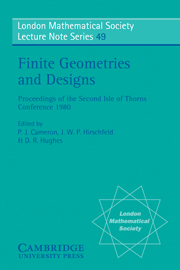Book contents
- Frontmatter
- Contents
- PREFACE
- Introduction
- Generalized Steiner systems of type 3-(v, {4,6}, 1)
- Some remarks on D.R. Hughes' construction of M12 and its associated designs
- On k-sets of class [0,1,2,n]2 in PG(r,q)
- Covering graphs and symmetric designs
- Arcs and blocking sets
- Flat embeddings of near 2n-gons
- Codes, caps and linear spaces
- Geometries originating from certain distance-regular graphs
- Transitive automorphism groups of finite quasifields
- On k-sets of type (m,n) in projective planes of square order
- On k-sets of type (m,n) in a Steiner system S(2, l, v)
- Some translation planes of order 81
- A new partial geometry constructed from the Hoffman-Singleton graph
- Locally cotriangular graphs
- Coding theory of designs
- On shears in fixed-point-free affine groups
- On (k,n)-arcs and the falsity of the Lunelli-Sce conjecture
- Cubic surfaces whose points all lie on their 27 lines
- Existence results for translation nets
- Translation planes having PSL(2,w) or SL(3,w) as a collineation group
- Sequenceable groups: a survey
- Polar spaces embedded in a projective space
- On relations among the projective geometry codes
- Partition loops and affine geometries
- Regular cliques in graphs and special 1½ designs
- Bericht über Hecke Algebren und Coxeter Algebren eindlicher Geometrien
- On buildings and locally finite Tits geometries
- Moufang conditions for finite generalized quadrangles
- Embedding geometric lattices in a projective space
- Coverings of certain finite geometries
- On class-regular projective Hjelmslev planes
- On multiplicity-free permutation representations
- On a characterization of the Grassmann manifold representing the lines in a projective space
- Affine subplanes of projective planes
- Point stable designs
- Other talks
- Participants
Regular cliques in graphs and special 1½ designs
Published online by Cambridge University Press: 05 April 2013
- Frontmatter
- Contents
- PREFACE
- Introduction
- Generalized Steiner systems of type 3-(v, {4,6}, 1)
- Some remarks on D.R. Hughes' construction of M12 and its associated designs
- On k-sets of class [0,1,2,n]2 in PG(r,q)
- Covering graphs and symmetric designs
- Arcs and blocking sets
- Flat embeddings of near 2n-gons
- Codes, caps and linear spaces
- Geometries originating from certain distance-regular graphs
- Transitive automorphism groups of finite quasifields
- On k-sets of type (m,n) in projective planes of square order
- On k-sets of type (m,n) in a Steiner system S(2, l, v)
- Some translation planes of order 81
- A new partial geometry constructed from the Hoffman-Singleton graph
- Locally cotriangular graphs
- Coding theory of designs
- On shears in fixed-point-free affine groups
- On (k,n)-arcs and the falsity of the Lunelli-Sce conjecture
- Cubic surfaces whose points all lie on their 27 lines
- Existence results for translation nets
- Translation planes having PSL(2,w) or SL(3,w) as a collineation group
- Sequenceable groups: a survey
- Polar spaces embedded in a projective space
- On relations among the projective geometry codes
- Partition loops and affine geometries
- Regular cliques in graphs and special 1½ designs
- Bericht über Hecke Algebren und Coxeter Algebren eindlicher Geometrien
- On buildings and locally finite Tits geometries
- Moufang conditions for finite generalized quadrangles
- Embedding geometric lattices in a projective space
- Coverings of certain finite geometries
- On class-regular projective Hjelmslev planes
- On multiplicity-free permutation representations
- On a characterization of the Grassmann manifold representing the lines in a projective space
- Affine subplanes of projective planes
- Point stable designs
- Other talks
- Participants
Summary
Many strongly regular graphs constructed from designs contain cliques with the property that every point not in the clique is adjacent to the same number of points of the clique. In the first section we give some examples and investigate various properties of such regular cliques. In particular, parameter relations and inequalities are discussed. Section two defines special 1½ designs as a certain class of designs with connection numbers 0 and Λ, generalizing partial geometries. Notable examples of special 1½-designs are transversal designs and classical polar spaces. It is shown that the point graph of a special 1½-design is strongly regular, and the blocks are regular cliques in the point graph.
As applications we reprove a result of Higman on partial geometries with isomorphic point graphs, and improve an inequality of Cameron and Drake concerning the parameters of partial Λ- geometries.
REGULAR CLIQUES
In this paper, all graphs are finite, undirected, without loops or multiple edges. A strongly regular graph (SRG) is a graph with v vertices (or points) such that
(Rl) every vertex is adjacent to k other vertices;
(R2) the number of vertices adjacent to two adjacent vertices is always ʎ;
(R3) the number of vertices adjacent to two nonadjacent vertices is always μ.
A graph is called regular, respectively edge-regular, if only (Rl), respectively (Rl) and (R2) holds. A clique C (i.e. a complete subgraph) is called regular if every point not in C is adjacent to the same number e > 0 of points in C; we call e the nexus of C. Of course, C is a maximal clique unless e equals the size of C.
- Type
- Chapter
- Information
- Finite Geometries and DesignsProceedings of the Second Isle of Thorns Conference 1980, pp. 244 - 259Publisher: Cambridge University PressPrint publication year: 1981
- 5
- Cited by

